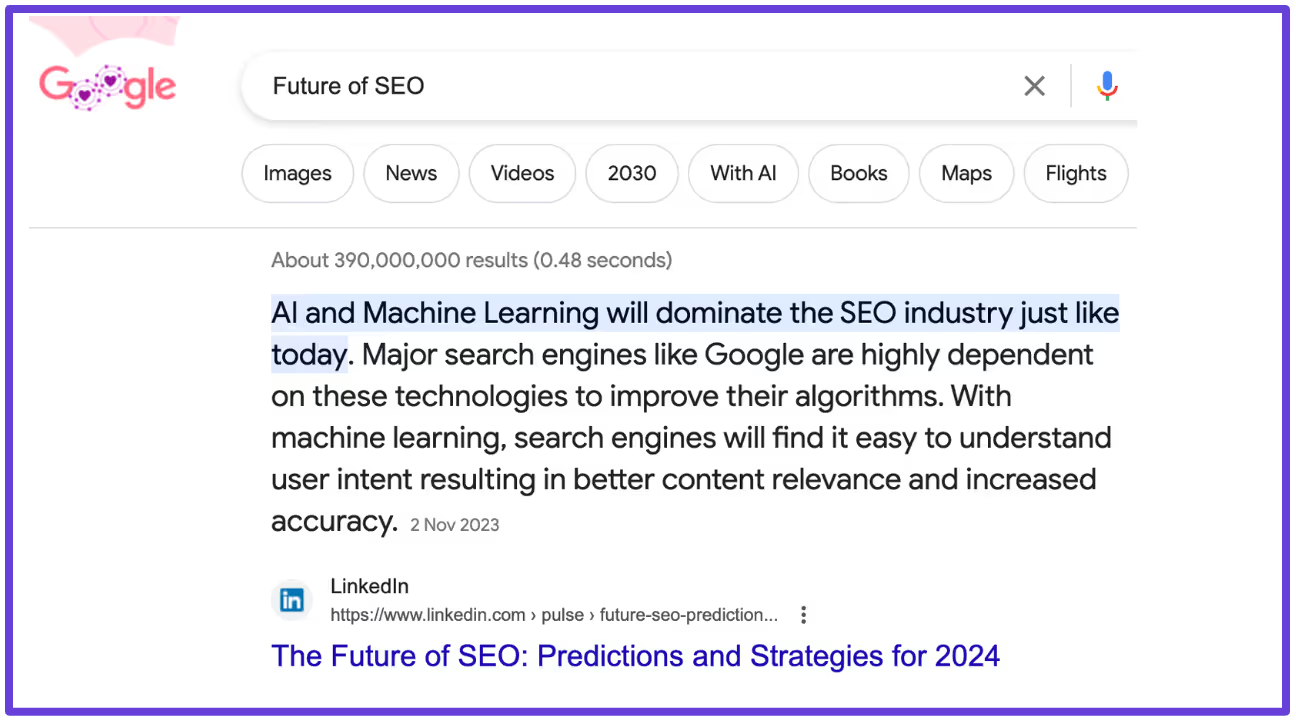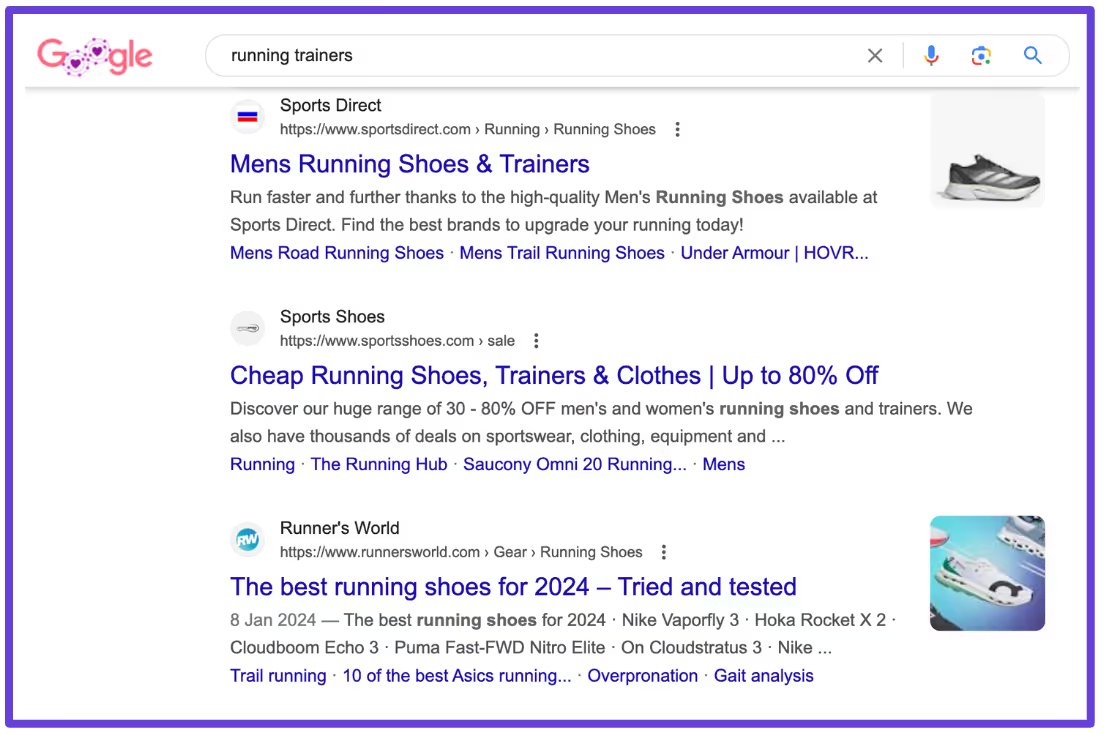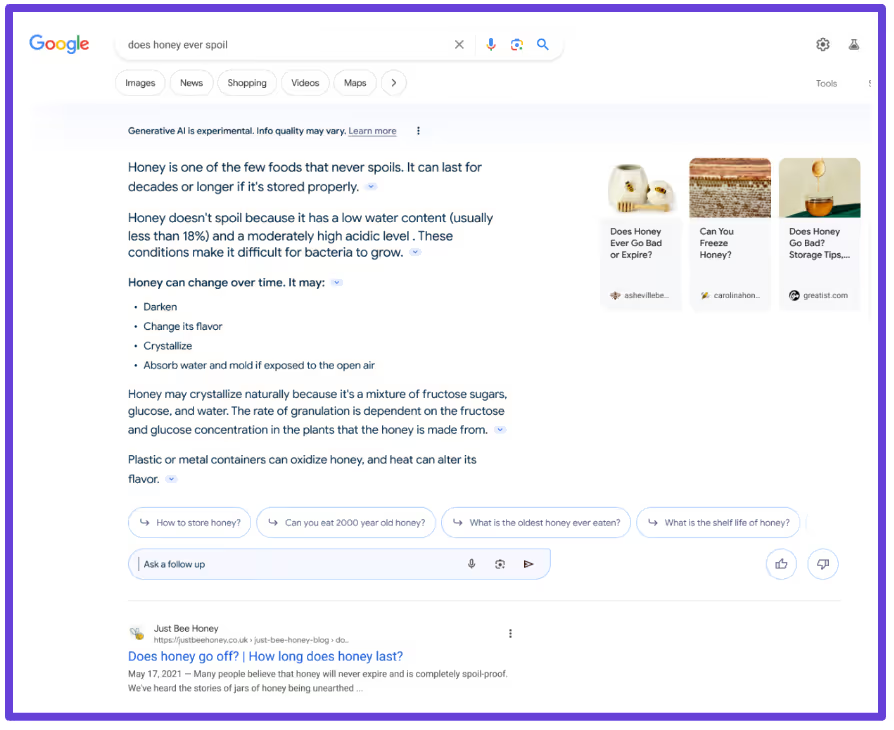Is SEO dead?
In short, no. People are still using search engines to find information, research products, and learn new things — but the way Google organizes and delivers search results has changed. In the past, Google simply served a list of links, but now search results provide a more interactive, engaging experience with featured snippets, product spotlights, FAQs, and multimedia listings.
Some people might think that SEO is, if not dead, dying, because ranking has become harder — or at least ranking seems harder these days. And it is true that Google is a lot more selective about the results it shows to searchers.
It’s no longer a matter of stuffing keywords into a piece, adding a few backlinks from questionable sites, and hitting the top spots in seconds. Instead, brands have to carefully consider the content they’re creating and ensure that it’s providing searchers with the best experience possible.
According to the Data: SEO Is Very Much Alive
Google processes more than 6.3 million searches a minute. That’s 9.72 billion searches every day. But are generative AI tools likeChatGPT about to take over? According to Sam Altman, ChatGPT has more than 100 million weekly active users. It’s difficult to find stats that show how many people are using it as a search engine, but it’s hard to believe that it’ll overtake Google any time soon when, according to recent studies conducted by Stanford and UC Berkeley, it’s shown itself to be unreliable at delivering accurate information.
Research shows that AI agrees with misinformation as much as 25% of the time, and another study found that 52% of ChatGPT’s answers are incorrect. This will probably improve as the technology evolves. But for now, there’s no comparison with a Google search.
This is particularly true in certain industries. For example, software buyers lean heavily on organic search during the research process. Google remains the number one source of information for people who are in the information-gathering stage of buying software, with 80% of searchers reporting that they’re either satisfied or very satisfied with the quality of search results.
But Search Results Have Changed
The Google we see today is not the same Google that existed even five years ago. New features reduce the number of click-throughs because they aim to provide all the relevant information in one place.
The most prominent recent addition is featured snippets. These sit right at the top of SERPs (search engine results pages) and answer the search query as concisely as possible.

To create a featured snippet, Google pulls the most relevant section from a high-ranking page — this way, searchers don’t need to click through multiple listings to find what they’re looking for. This has led to a rise in the number of brands competing with zero-click content — content that targets the featured snippet spot.
An Ahrefs study found that 12.3% of search queries have a featured snippet, 8.6% of clicks go to featured snippets, and — the big one — 30.9% of featured snippets rank in position one.
While the featured snippet aims to reduce the number of click-throughs (because searchers can get everything right on the SERP), brands can still generate organic traffic if they secure the featured snippet.
Other factors impact the ranking algorithm, such as quality backlinks, domain authority, and keyword relevance, but brands that provide an answer to a specific question or work to understand and provide what people want from a search query will see more success in SERPs.
This is why search intent is so important. Search intent describes the purpose of a search and informs the results Google will show. For example, when you Google “running shoes,” most results are links to products or product roundups. A brand that tries to target the same keyword with an article on how running shoes are made isn’t going to see great results, because that’s not the kind of content searchers are looking for.

Will Google’s Search Generative Experience (SGE) Change Things?
Google is experimenting with its own AI-powered chatbot, after the launch of Bing Chat and the uptick in people using ChatGPT to perform searches. Similar to Bing Chat, Google’s SGE lets users ask questions and get information that isn’t displayed in the traditional SERP list format. Instead, SGE delivers its answers in complete sentences with references.
Google aims to serve a personalized, unique page of relevant content for every search, so users don’t have to click through multiple links to find information. This might reduce search traffic for some queries but not others. For example, it might reduce search traffic for basic questions like “What is SGE?” but not for search queries that are technical or that target long-tail keywords. These kinds of searches require a deeper dive, which means searchers might want to explore several links or learn from detailed tutorials.
Here’s what a SERP will look like when you use Google’s SGE.

The Google team hopes SGE will help people:
- Ask new kinds of questions that are more complex and descriptive.
- Get the gist of a topic faster, with links to relevant results to explore further.
- Get started on something they need to do quickly right from where they’re searching.
- Make progress easily by asking conversational follow-ups.
Google says SGE will create an “integrated experience” for searchers:
“These snapshots serve as a jumping-off point from which people can explore a wide range of content and perspectives on the web. SGE will show links to resources that support the information in the snapshot, so people can check the information themselves and explore further. This allows people to dig deeper and discover a diverse range of content, from publishers, creators, retailers, businesses, and more, and use the information they find to advance their tasks.”
Despite still providing links to resources, there’s an expectation that SGE will reduce organic traffic for many keywords because searchers can get a complete, AI-generated answer as a search result. The HOTH predicts that every website currently ranking on Google will experience a 25% drop in organic traffic when SGE goes live.
There’s some good news, though: brands that struggle to reach the top 10 organic results might have a chance of snagging a spot within SGE.
According to research, the AI-generated answers in Google’s SGE don’t match any links from the top 10 organic search results for the same search query 93.8% of the time.
As SEO expert Brian Dean said on the Optimize podcast, “I don't think SGE is a huge threat to SEO as we know it. And right now, according to how it looks currently, it's more or less a featured snippet at the top of the results. And if they expand it, which [Google] has shown a few times in mockups, it looks like those references are pretty high up, actually above the fold for the first time in a long time, next to the SGE-generated result.”
SEO Is More Competitive Than Ever: Here Are 4 Ways You Can Stand Out
In a landscape riddled with AI-generated answers, zero-click content, and more competition than ever, here’s how you can leverage SEO to continue attracting organic traffic to your site.
1. Target Search Intent
Search intent is everything. If your content doesn’t meet searchers’ expectations, they’ll go elsewhere. Before you publish new content, take a look at the top search results for your chosen keyword or topic to see what types of pages sit at the top. Are they lists? Are they product pages? Are they detailed tutorials? This should guide the form your content takes.
Google knows what users want, and it’s pretty clever about serving the right content for search terms. While it can be tempting to do something different to stand out, breaking away from the norm can harm your rankings.
2. Target Long-Tail Keywords
Competition for popular keywords is fierce, particularly in industries like software, insurance, finance, and professional services. To stand any chance of winning, SEOs need to target longer-tail keywords that have less competition.

The search query “email marketing” returns more than three billion results in Google, and it has a keyword difficulty score of 90. Ranking for this term isn’t for the faint-hearted.

Instead, target long-tail keywords that address specific pain points or answer particular questions. The search volume might not be as high, but you stand a better chance of ranking well — and searchers using these queries are more likely to convert.
3. Improve the Quality of Your Content
“The idea of publishing content just because it might rank on Google and get traffic is dead, and now more than ever, every site needs a strategy about how and why they are adding value,” says Eli Schwartz, a leader in SEO who coined the phrase product-led SEO and who was a recent guest on the Optimize podcast.
Google’s latest helpful content update improves search results by making sure they meet users' expectations. This means that Google prioritizes authentic content written by subject matter experts with personal experience and demotes content that’s specifically created for search engines. But keep in mind that helpful content has to be prevalent across your entire site, not just one or two pages.
Here’s what Google says:
“Any content — not just unhelpful content — on sites determined to have relatively high amounts of unhelpful content overall is less likely to perform well in Search, assuming there is other content elsewhere from the web that’s better to display. For this reason, removing unhelpful content could help the rankings of your other content.”
Kevin Indig touched on this in a recent Optimize podcast episode. “Expertise is really important, and there’s this idea of comprehensiveness that Google references and mentions in their documentation,” he said. “It’s basically, do you cover the topic holistically? For example, car insurance is a very broad topic, but there’s a lot to be covered and a lot of questions that people have. Google will check if you go into all these questions and give answers that are helpful and not too fluffy.”
The idea is to create content that, when compared with other search results, is more complex, written by an expert, and thoroughly covers the topic. It should provide more depth and value than any other piece of content on the topic.
4. Optimize for Featured Placements
And finally, if you can’t beat them, join them. Google is placing more emphasis on results that answer a question in a sentence or two, or that provide a concise how-to list. Optimizing your content for these SERP opportunities will help you secure featured snippet spots and appear in the “People Also Ask” section of SERPs.
Some SEO Practices Have Died
While SEO as a whole isn’t dead, certain outdated SEO practices have kicked the bucket — and for good reason. The Penguin and Panda algorithm updates in the 2010s killed off several black hat SEO practices, including spun content and amassing low-quality backlinks from private blog networks (PBNs). These updates penalized sites that practiced keyword stuffing, rewrote pieces to increase their content output, and secured links from multiple dubious sites.
There’s still a place for strategic keyword implementation and building high-quality backlinks, but gone are the days of churning out 500-word pieces just to increase the number of pages on a website.
If we’re talking about SEO in this sense, then yes — these spammy practices no longer work. Instead, search results now feature original, authentic content that answers questions, addresses search intent, and provides searchers with a unique reading experience.
Final Thoughts
According to articles dating back to the late 2000s, SEO has died multiple deaths over the past two decades. But the reality is that it’s simply changed to align with consumer needs. Searchers want unique content that’s backed by data and created by experts, not surface-level, keyword-stuffed content that’s written purely to rank.
ChatGPT had us all questioning the future of SEO for a while, but even that wasn’t enough to pull people away from search engines completely.
What has died is content for content’s sake. Samey pieces on well-covered topics will no longer drive the thousands of eyeballs they did in the past. Instead, Google is putting the searcher first. The new SGE format will promote zero-click content while providing searchers with detailed resources that answer their questions. Brands that practice a people-first approach to SEO and create useful content that covers a topic holistically will be the ones that win in our evolving search landscape.





